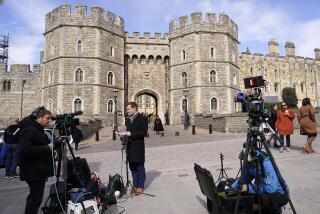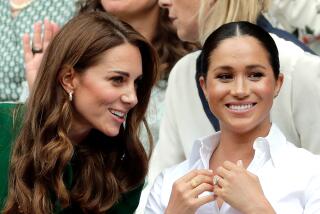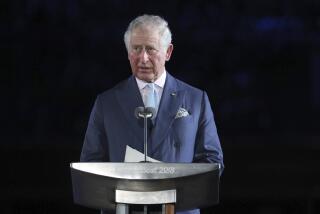Prince charming at 21
- Share via
London — London
Come Saturday, much of the United Kingdom will be consumed with thoughts of one young Englishman known the world over ... and it’s not Harry Potter. On that day, Prince William -- who, with his pin-up good looks, Windsor pedigree and resemblance to his iconic mother, has brought a renewed support to a battered but enduring monarchy -- will turn 21.
For the record:
12:00 a.m. June 19, 2003 For The Record
Los Angeles Times Thursday June 19, 2003 Home Edition Main News Part A Page 2 National Desk 1 inches; 42 words Type of Material: Correction
Prince William -- An article in Wednesday’s Calendar about Prince William turning 21 this weekend mistakenly stated that he is Queen Elizabeth’s eldest grandson. Her eldest grandson is Peter Phillips, the son of Princess Anne and Mark Phillips. Peter Phillips is 25.
Despite his mass appeal, William, who is two-thirds through his history of art course at St. Andrews University in Scotland, remains something of an unknown quantity to the British public.
“William is physically appealing, so people warm to him,” says Andrew Morton, Britain’s most famous royal watcher and biographer. This doesn’t mean, of course, that his future subjects know very much about his character. “He’s the most protected prince of the species,” says Morton, author of the bestselling “Diana: Her True Story.”
The one print interview William has given to mark his birthday, to the Press Assn., was remarkable only for its ordinariness and, apart from revealing the fact that he’s attempting to learn Swahili, did little other than paint a picture of a pretty regular college kid.
“I love the buzz of towns and going out with friends and sitting with them drinking and whatever -- it’s fun,” he said. “But at the same time, I like space and freedom. I like cinemas, bars, restaurants and lots of sport -- on the beach, playing golf.”
Such banal insights were enlivened by the occasional humorous (perhaps unintentionally so) observation by the art-studying prince: “I did my dissertation on Leonardo da Vinci’s drawings, which, of course, are in the Royal Collection, so I was very lucky.” Few young men, after all, have grandmothers with masters hanging on every wall.
But even a milestone birthday will not put the son of the 54-year-old Prince Charles and the late Princess Diana into much of a spotlight. He will be celebrating along with younger brother Prince Harry at a private party in Windsor Castle for 250 friends (its theme: “Out of Africa”), and he’ll be carrying out a few public engagements in Wales with his father. Otherwise, there will be no official ceremonies, no processions or fireworks displays of the sort usually associated with the royal family.
There have been reports here that image-conscious royal advisors wanted to capitalize on the prince’s popularity by holding something similar to last year’s hugely successful Jubilee rock concert but that this was rejected by the prince. Instead, there will be a simple set of special commemorative stamps issued, depicting him in several poses.
The prince’s reluctance to face the press -- “William loathes the mass media for what they did to his mother,” says Morton -- has not stopped television, papers and magazines here from going into overdrive. Last week there were two major television documentaries on the prince (both without his participation), characterizing him as the Reluctant Royal. Newspaper profiles describe his insistence that no one address him with the prefix “his royal highness,” and his desire to delay for as long as possible the onset of a life dominated by arduous officialdom and rounds of royal duties. He has been described variously as “wise beyond his years” and “fractious, spoiled and difficult.”
Despite being the living embodiment of his mother’s memory, in his love for outdoor country sports, such as target shooting, hunting and fishing, he is paradoxically very much a traditional royal. “He’s far more of a Windsor,” says Morton. “If Queen Victoria came back today, she’d be perfectly happy with his upbringing.”
Rampant speculation
However, the lack of access to the young prince has meant that speculation is the order of the day. There has been talk -- greeted with alarm by traditionalists -- that he intends to live in New York and work for one of the major auction houses. Other newspaper reports have claimed that he will follow the usual family route and do a stint in the military. Some media commentators have gone so far as to suggest that, such is William’s stubborn individuality, he might even refuse the ultimate destiny Britain’s hereditary principle ordained for him at birth: the throne.
His interview threw little light on the frenzied speculation about his future. “I’m really just concentrating on getting through the next two years. I honestly haven’t thought about what I’m going to do next.”
It is certain that behind the scenes others are less relaxed. William, after all, and to a lesser extent Harry, represents the future prospects of the monarchy and its popular image. “In our celebrity-obsessed age, two lovely young men, one of whom is extremely handsome, can’t hurt,” says historian Sarah Bradford, biographer of Queen Elizabeth.
Increasingly, the life of Queen Elizabeth’s eldest grandson will be ever more scrutinized. Already this week, royal officials are denying a newspaper’s claim that William is dating a 21-year-old woman he met while visiting Kenya, Reuters reports. Each decision he now makes, and those that are made for him, will be dissected and judged in the media.
The interest may be all the more intense because William is seen as reuniting two elements in British society that, in recent years, have been at war with each other: those who support the traditional way of doing things, and the Diana fans who saw in her a rebel against an outmoded and remote hierarchy.
This realization has meant that coverage of William’s birthday has invariably mentioned the chances of his leapfrogging over his father and succeeding to the throne after the queen. Charles’ popularity is much more erratic and, although his companion Camilla Parker Bowles is far more accepted now and appears regularly with him in public, he is tainted by the scandal of their affair, and errors of judgment and public relations disasters in the aftermath of Diana’s death. “After the Diana affair, some people still haven’t forgiven Charles,” Bradford says.
The slim, 6-foot, 2-inch William would, so the argument goes, be a bright, young charismatic king for the 21st century. One recent opinion poll showed that there is considerable support for this among the British public, with one in three believing that he should be crowned instead of Charles. His popularity is such that at the Jubilee last year celebrating Queen Elizabeth’s 50 years on the throne, the reception accorded William as he stepped out behind her onto the palace balcony was deafening, arguably more rapturous than that for the queen herself.
If the characterizations of William are true, he must view the prospect of becoming king ahead of his father with horror. He can relax, Morton says.
“There’s not a chance in a million,” he says. “Prince Charles is desperate to become king.”
Besides, such rejiggering of the line of succession could fatally weaken the whole monarchical hereditary principle; if one can just choose a more popular candidate regardless of his position in the pecking order, then it’s arguable that the whole point of a monarchy could come into question.
So it’s unlikely that Britain will have a King William V for many decades yet. Perhaps by then, he might even be fluent in Swahili.
More to Read
Sign up for The Wild
We’ll help you find the best places to hike, bike and run, as well as the perfect silent spots for meditation and yoga.
You may occasionally receive promotional content from the Los Angeles Times.






